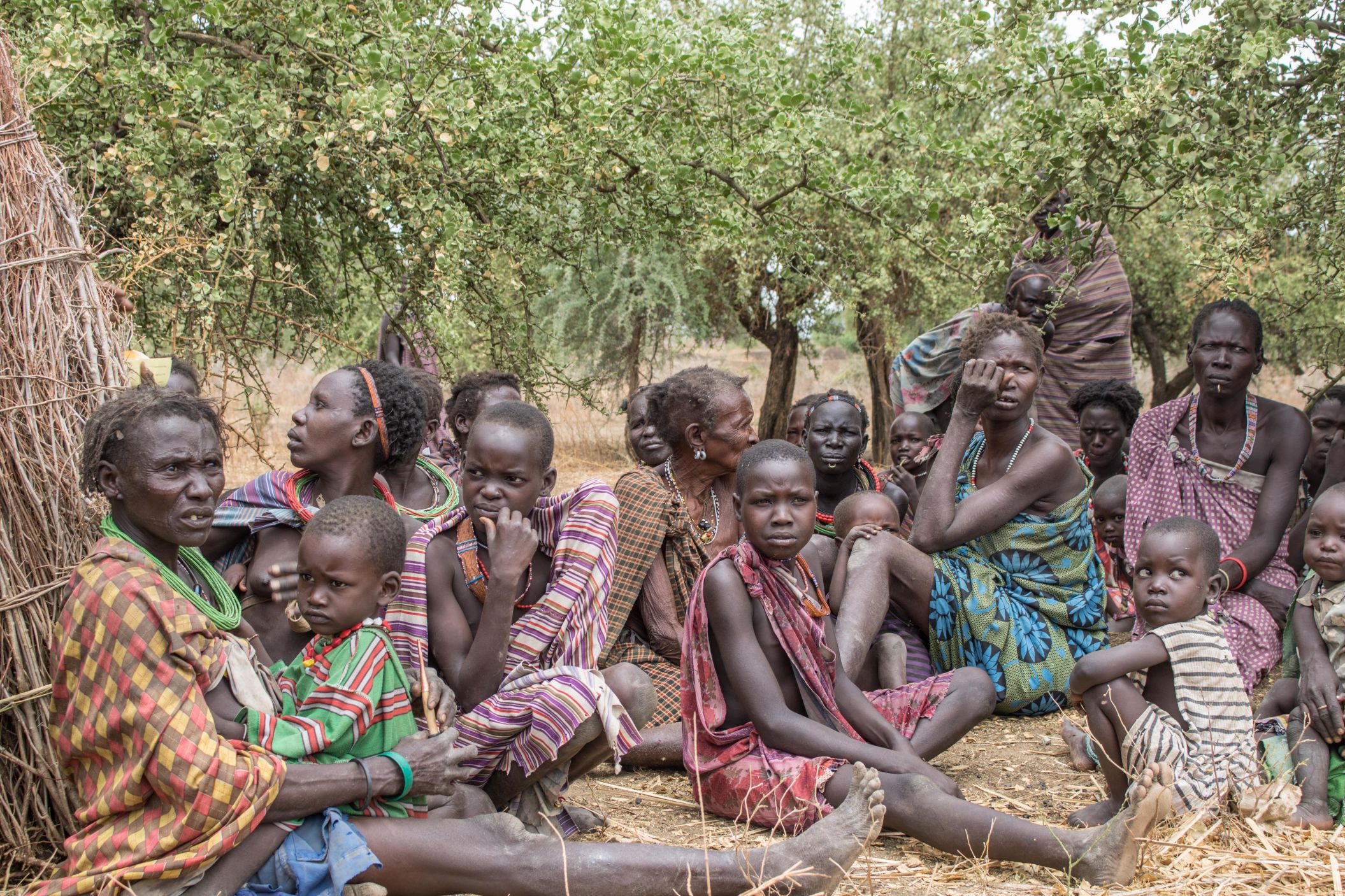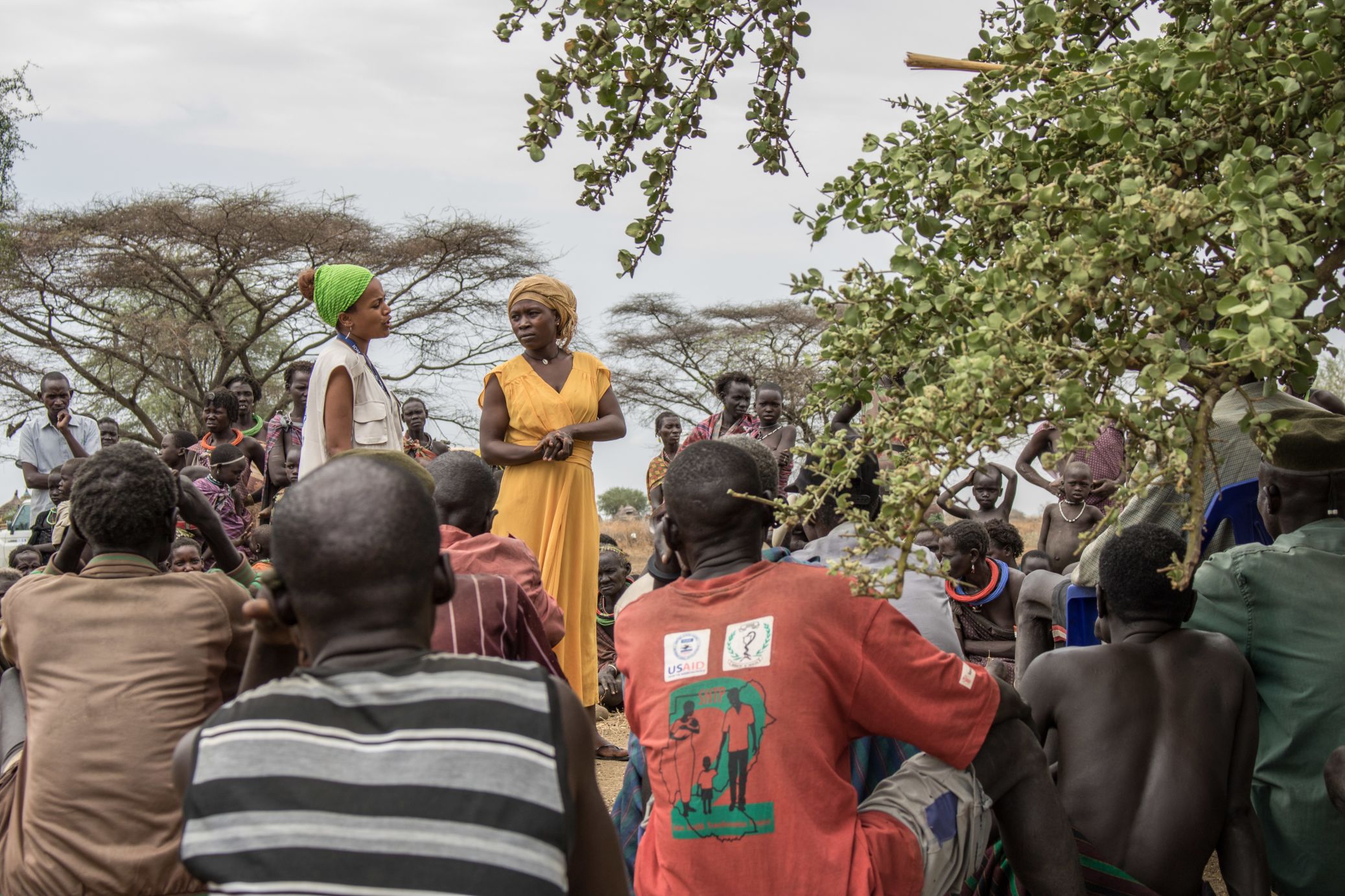Safe drinking water is fundamental to a healthy life, and yet 2.1 million people in South Sudan require assistance to gain access to safe and reliable water sources.
The conflict that erupted in December 2013 stalled developmental and rehabilitation efforts that were slowly taking grip after the country gained independence in 2011. The ongoing crisis has led to the destruction of what little infrastructure previously existed, forced millions from their homes and further reduced access to safe water sources.

A borehole repaired by IOM in a remote area of Kapoeta, South Sudan, has improved the community's access to safe water. IOM/McLaughlin 2018.
In areas where communities are displaced, they often have no choice but to fetch water from unsafe sources like seasonal rivers and shallow wells. Even communities in areas not directly affected by the war suffer from limited access to clean water, as years of underdevelopment have left boreholes broken or poor hygiene and sanitation.
This limited access to safe water and sanitation has exacerbated the detrimental effects of war, leading to disease outbreaks and even worsening severe malnutrition in extremely food insecure parts of the country.

In Nakachatuko Payam, Kapoeta North, IOM hygiene promoters introduce the community to a multi-faceted programme to undertake community-led initiatives to improve WASH conditions in their village. IOM/McLaughlin 2018.
With well over half of the country in need of relief aid, mitigating the widespread impacts of the crisis is daunting. But water, one of humans’ most trusted allies in nature, is a simple answer to reducing the life-threatening consequences of conflict on vulnerable communities.
In South Sudan, some of these consequences have manifested in yearly cholera outbreaks since the crisis began, the longest lasting from June 2016 to February 2017 and killing more than 430 people.

Nanyuru (right) and the women in her village used to have to walk an entire day and spend the night in a neighbouring village just to fetch water for their families. Now that they have access to a borehole closer to their homes, they can avoid this risky journey. IOM/McLaughlin 2018.
In Kapoeta, a remote area in eastern South Sudan, the 2017 cholera outbreak was devastating for many communities, with over 3,000 cases reported.
After several rapid interventions to improve water, sanitation and hygiene (WASH) conditions in affected communities, IOM returned in January 2018 to begin a longer-term project with USAID aimed at ensuring community involvement in water management and hygiene promotion, while also seeking to reduce the prevalence of gender-based violence.

Women from across Nakabwei Boma gathered for the introductory meeting with IOM to begin WASH improvements in their area. IOM/McLaughlin 2018.
In partnership with the local community, IOM recently repaired a borehole in Lotir Boma, Kanakatuko Payam, a remote village in Kapoeta North.
Nanyuru, a pregnant 25-year old mother of two, used to have to walk for an entire day to reach the nearest water point, where she would then have to spend the night, just to fetch water for her family.
“It was not safe to walk the long distance to get water. You could encounter bad people on the way, and they could even steal your water or harm you. We would go in groups, sometimes with men for protection, two times a week.”

Nanyuru pumps water at the rehabilitated borehole. IOM/McLaughlin 2018.
Now that she can access water closer to her home, Nanyuru and women like her can avoid the risks associated with the long walks. Still, she says, the population is too large for the borehole and they will continue to need support.

Women and children gather for the introductory meeting with IOM. IOM/McLaughlin 2018.
But the efforts do not end with ensuring access to water. When meeting Nanyuru, she and other women said that they still become sick, pointing to dirty jerry cans. They cannot consistently access soap, and they said that using ash—a common alternative to soap—to clean is taboo in their culture.
Recognizing the need for greater awareness of basic hygiene and sanitation practices to encourage more sustainable improvements in health and WASH conditions, IOM will work closely with the community to share and in still good WASH practices.

Hygiene promoter Meti Gobena explains the health risks associated with poor hygiene and sanitation practices. IOM/McLaughlin 2018.
IOM is working with the local communities in Kapoeta to repair boreholes and train hygiene promoters, form water management committees and promote gender equality in the improvement of WASH and health conditions in the community.
Timely implementation is key, as access much of the area will, ironically, become more difficult as the rainy season sets in, making roads extremely difficult to pass and filling seasonal rivers, essentially blocking road access to the area.

Elizabeth, a women's leader in Nakabwei, encouraged her community to partake in the initiative and told IOM “you built our trust. You came back after your assessment to help us.” IOM/McLaughlin 2018.
The community expressed excitement and willingness to begin the project immediately.
Speaking to IOM and his community, Chief Alberto Lokolo said “water, hygiene and sanitation are all problems for us. Water is life, people are here because of water.”

Nanyuru fetches clean water. IOM/McLaughlin 2018.